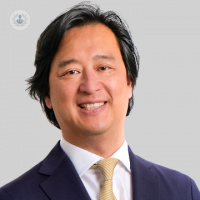Do I need glasses after cataract surgery? FAQs answered
Autore:Cataract surgery is one of the most popular elective surgeries globally. Thanks to this quick procedure, your vision can be restored and your lens protected from further age-related deterioration. Mr Kin Sheng Lim has assisted countless patients with their vision and in this article, he provides you with the answers to frequently asked questions.

How is cataract surgery performed?
Cataract surgery is usually performed as a day case and can be performed under local anaesthetic, general anaesthetic or sedation: largely depends on the patient’s preference.
What are the risks and how common are they?
The risks of cataract surgery include:
- rupture of the lens capsule during surgery
- infection
- other complications that require further surgical treatment (such as retinal detachment)
However, under the hands of an experienced surgeon, the risk of a complication is less than 1%.
How quickly can I see after surgery?
The results of cataract surgery are usually very quick, particularly in uncomplicated and simple cases where visual improvement will become noticeable the next day. In some patients, inflammation may last longer in which case visual recovery may take longer (up to one week).
How quickly can I go back to normal activity and travel after cataract surgery
In general, following uncomplicated and straightforward cataract surgery, you can go back to normal activity within 24 hours. There is no restriction on travel and this includes flying within even two days after surgery. However, if the inflammation persists after surgery, your vision may be blurry and you may have to ease yourself back into a normal routine.
Can I be spectacle free after cataract surgery?
In general, most patients after cataract surgery will choose to have good distance vision in both eyes but not near vision. Therefore, they will need glasses for near vision.
However, some patients can have monovision, which is having one eye with distance vision (emmetropia) and the other eye with near vision (myopia). In this instance, a patient may be spectacle free except when they need to read small-print for a long period of time or in circumstances that demand clearer distant vision, such as driving or watching a cinema screen.
There is the option of multifocal intraocular lenses. These may be suitable for some patients who want the convenience of not having to wear glasses at all. This lens comes with a small risk of visual disturbances such as a visual halo around lights after surgery and therefore, patients must understand the exact benefit and risks involved before undergoing multifocal intraocular lenses, as replacement of lens after surgery can be a complicated procedure.
In general, patients who had a retinal problem or glaucoma are generally not suitable for multifocal lens implantation.
If you have a significant amount of astigmatism, your surgeon may recommend using a special intraocular lens to reduce the level of astigmatism after surgery to make your vision clearer.
How many appointments do I need before surgery?
At the appointment of your cataract surgery diagnosis, depending on other associated eye problems, the most important aspect of the consultation is to discuss the refractive outcome for individual patients. Essentially, this is whether a patient is suitable for multifocal lenses or other types of lenses.
During this consultation, you will also need to have a measurement of your eyes performed. This is an important measurement that determines the type and power of lens that is most suited to your specific needs.
How many post-op visits do I need after surgery?
Patients having cataracts surgery need to be seen1-2 days after the operation and then 6 weeks after when they will be ready to have a new pair of glasses fitted. However, if there is persistent inflammation or other complications, patients may need to be seen more frequently.
Mr Kin Sheng Lim is an internationally renowned consultant ophthalmologist who provides eye care of the highest quality. Get in touch with him via his profile.


